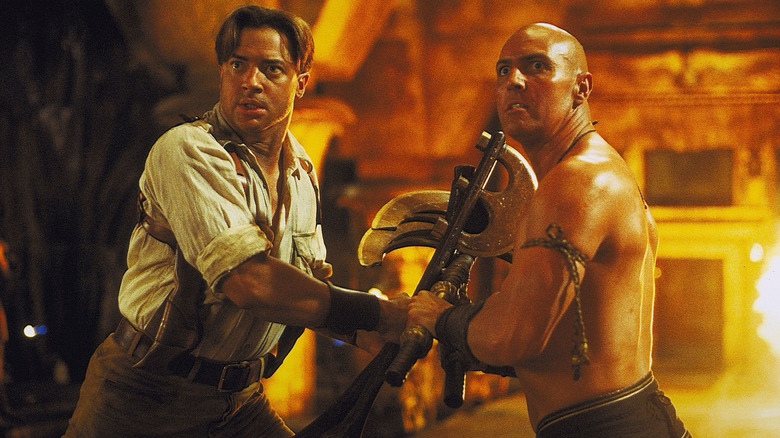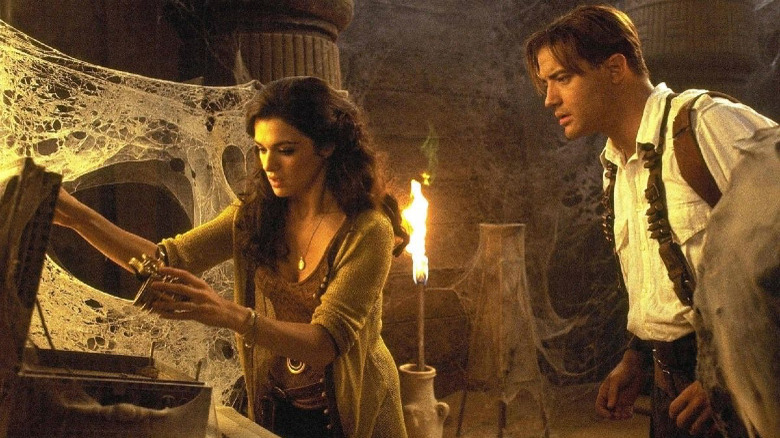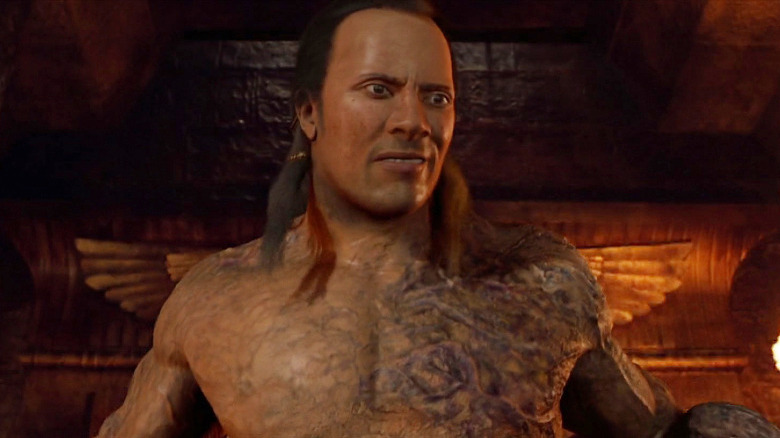The Mummy Returns Was Almost Scrapped By Director Stephen Sommers
Stephen Sommers' "The Mummy," a swash-buckling 1999 remake of Karl Freund's 1932 horror movie of the same name, almost works on accident. It's derivative of the "Indiana Jones" films but has just enough quirks and personality to set itself apart. It's tongue-in-cheek, but without being obnoxiously self-aware. Its villain Imhotep (Arnold Vosloo) is even genuinely horrifying at times, though not so much as to give you tonal whiplash when the strapping Rick O'Connell (Brendan Fraser) scares him away with a hissing cat.
This also feels like a good place to mention that everyone in "The Mummy" is extremely hot, which assuredly doesn't hurt its quality, either.
"The Mummy" was an unexpectedly big hit at the box office, even holding its own against "Star Wars: The Phantom Menace" (which opened in theaters less than two weeks after it arrived). It would end its run with a gross of $416.4 million on an $80 million budget — more than enough to pique Universal's interest in a follow-up. Sommers, on the other hand, was a little more cautious. He had yet to direct a sequel at that point in his career, and for good reason.
"Sequels usually suck," he told Entertainment Weekly matter-of-factly in 2001.
Murphy's Law
The irony, of course, is that Sommers was already in the middle of promoting his finished sequel, "The Mummy Returns," by the time he made that comment. Still, he had given real thought to scrapping the whole thing, having struggled enough to figure out the alchemy of his first "Mummy" movie during post-production. Fraser commented on this to EW, stating:
"The original script was a bit reckless. The characters related to one another a bit awkwardly. And the dialogue needed to be pared down. But it really was okay in the end."
Sommers, on the other hand, wasn't about to take it for granted things would out as well the second time around. It seems he had Murphy's Law (as in, the adage that states, "Anything that can go wrong will go wrong") on the brain by the time he began to think seriously about making a sequel. His fears ranged from cast members demanding a higher salary to the original actors dying in-between films:
"If I waited two or three years, I might not have been able to bring back the same actors. Some of them might have been asking $20 million a movie by then. Or, God forbid, one of them might die. And there's no way I would have made a sequel without the same actors."
Thankfully, nobody died, although Fraser did initially ask for $20 million to reprise his role as Rick. He would later agree to $12.5 million, a payout he deserved as much as any actor, having amassed all sorts of wear and tear with his stunt-work on "The Mummy." His primary costars would also sign on for "The Mummy Returns," with Dwayne Johnson joining them in his acting debut as the malicious Scorpion King. Would lightning strike twice after all?
The (diminishing) Mummy Returns
"The Mummy Returns" is moderately fun. Sommers stages some energetic action scenes and set pieces, including a nifty chase in 1930s London (one featuring several mummified minions and a double-decker bus) and some fancy sword-fights in flashbacks to ancient Egypt. Similarly, Fraser once again brings a mix of rugged charm and comedic timing to his role as Rick, and his interactions with Evelyn (Rachel Weisz) — Rick's love interest turned wife, who gets to do a little more fighting this time while still retaining her adorkable scholarly persona — are legitimately romantic.
Beyond that, however, "The Mummy Returns" fails to replicate the formula Sommers stumbled upon with "The Mummy." The jokes tend to clang, the plot is more convoluted than it needs to be, and the film goes overboard on spectacle at the expense of its characters. Where the discordant pieces of "The Mummy" come together to work in surprising harmony, "The Mummy Returns" creaks and groans on its way to the infamous showdown between Rick, Imhotep, and an uncanny CG Johnson that's part-human, part-scorpion, 100 percent nightmare fuel (in a bad way).
In hindsight, that outcome might have been inevitable. The specific alchemy of the '90s "Mummy" has proven very tricky to recreate, as evidenced by the trio of "Mummy" films produced in the years since then (including 2008's "The Mummy: Tomb of the Dragon Emperor" and the much-maligned 2017 reboot movie starring Tom Cruise). Even Sommers never seemed to figure out exactly what he got right, between the so-so "Mummy Returns" and his poorly-received trip back to the realm of Universal monster action-horror with 2004's "Van Helsing."


